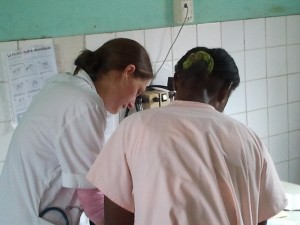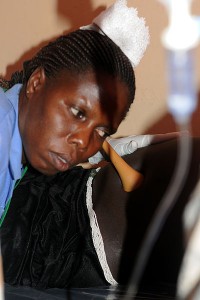The fifth pregnant patient enters the Madame Sy’s consultancy room, the head midwife of the district hospital. One sits on the examination table with a trainee, one next to her, one on a chair facing Madame Sy and two in a corner. While I wonder what privacy means in this culture I see a nice conversation arising between these women on the topic of baby food. Meanwhile Madame Sy asks me (I’m sitting in the other corner) for the third time about my training and experience.
 It seems to be very important that I strongly position myself, so relationships are clear. Next to my title and training I need to share my experience extensively. My Dutch attitude of “act normal, we can all learn from each other” is not understood. I learn a lot during my internship in preparation for the prenatal clinic. With my internship I want to learn how this government hospital organises prenatal care. I also want to invest in strong relationships with my Senegalese colleagues.
It seems to be very important that I strongly position myself, so relationships are clear. Next to my title and training I need to share my experience extensively. My Dutch attitude of “act normal, we can all learn from each other” is not understood. I learn a lot during my internship in preparation for the prenatal clinic. With my internship I want to learn how this government hospital organises prenatal care. I also want to invest in strong relationships with my Senegalese colleagues.
An interview with the “Médicine Chef”, the district’s first responsible physician is a first step. With a smile he welcomes me. The question why I took me 8 months before coming over to visit him was to be expected. Distrust is also part of the formal culture.
On the prenatal care unit Madame S explains motherly how to keep the registration of government statistics. In huge books that cover an entire desk, each visit, test, treatment, etc. must be written down. The midwives work precisely, a computer would make quite a difference!
 The delivery room is simple, small and chaotic. I have great respect for my Senegalese fellow doctors who, in a room where five laboring women share two beds, need to assess the heart tones of an unborn baby with wooden stethoscopes. There is no electrical device to be seen, the CTG monitor I miss most. Thankfully the doctors have great skill in assessing and diagnosing!
The delivery room is simple, small and chaotic. I have great respect for my Senegalese fellow doctors who, in a room where five laboring women share two beds, need to assess the heart tones of an unborn baby with wooden stethoscopes. There is no electrical device to be seen, the CTG monitor I miss most. Thankfully the doctors have great skill in assessing and diagnosing!
It is a training hospital and supervising is carried out by the chief gynecologist Dr. Abdourachmane, a remarkably quiet man in this hectic environment. He is a great help for me with his outstanding medical knowledge. Dr. Abdourachmane is very well informed on the (mostly French) guidelines and literature. However, it appears to be a major challenge to be applying these in a hospital without many means and a group of patients with no money. I’m amazed to see how precise he works in an environment where scepticism and indifference lurk.
The last Wednesday I receive my own thick registry books. On the ward I see a young woman, whom I’ve sent to the hospital the day before with an ectopic pregnancy. She tells me that she received swift and adequate care. My internship already has advantages!